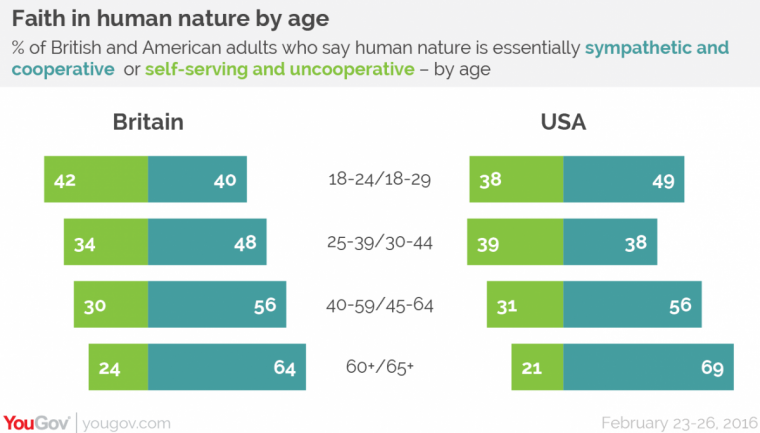YouGov survey sheds light on the ancient question: Are people basically good or bad?

If you aren't a liberal when you're 20 you haven't got a heart, and if you aren't a conservative when you're 40 you haven't got a brain.
Versions of that saying have been attributed to everyone from Churchill to gospel singer Larry Norman, and it manages to offend pretty much all young people by claiming young social liberals are brainless and young conservatives are heartless.
It obviously has a political agenda and it isn't true. But is it necessarily wrong to say that our basic attitude to other people changes over time?
According to a YouGov survey released last week, possibly not.
The survey found that it's older people who are more likely to say humans are essentially cooperative rather than self-serving, while young people have a much less sunny and optimistic view of human nature.
In Britain, there are only two demographic groups who are more likely to say human nature is basically self-serving and uncooperative rather than cooperative and sympathetic – young people (42 per cent uncooperative, 40 per cent cooperative) and UKIP voters (49 per cent uncooperative, 40 per cent cooperative).
In both Britain and the US, the proportion of the population that believe people are basically cooperative increases with age. In both countries, less than half of under-40s hold the optimistic view compared to over a third of the oldest generation.
According to YouGov, traditionally right-wing theories have adopted the uncooperative view of human nature, and Conservatives (41 per cent) are more likely to take this view than Labour voters (32 per cent). But young people are less likely to be right-wing, so why are they so cynical? And does the Bible give us any help in understanding what's going on?

Here's a thought. Young people are at a stage in life where they're forming their identities. They're having to fight their corner, get noticed at work or at school or college, and work out the sort of person they're going to be. They're falling in and out of love and getting hurt in the process. They're intensely conscious of themselves and their needs. They have all sorts of experiences of grace, but they're more likely to feel it's them against the world. And they also have a highly developed sense of justice that makes them hyper-sensitive to things that are just wrong – and it's easy for these things to skew their perception of life in general and make them think the worst of people.
As time goes by, they realise that's not true. Yes, as Cat Stevens sang, "a lot of nice things turn bad out there". But we have just and secure societies because that's what most people want. On the whole, most people are pretty kind and helpful. For the majority of us, age teaches us more about people's goodness than it does about their wickedness.
But does the Bible have anything to say to us? Arguably, yes. It does teach about sin. There is an inbuilt bias in our nature, such that even our best attempts to live good lives and do good things go wrong. At the same time, though, it witnesses to God's universal grace to everything he's made. "I was young and now I am old, yet I have never seen the righteous forsaken or their children begging bread" (Psalm 37:25); as we age, our experience is more of grace than of its lack.
"He causes his sun to rise on the evil and the good, and sends rain on the righteous and the unrighteous," says Jesus (Matthew 5:45); whether they are believers or not, everyone shares in God's blessings.
It can be really hard to be a young person, perhaps especially today. So surveys like this have a simple but important message for older Christians. They remind us how important it is to encourage younger people and to be kind, thoughtful and respectful to them. We can help shape the mindset of a generation. And people who grow up believing the best of others will behave very differently from those who grow up believing the worst.
What sort of people do we want our successors to be? Loving and trusting, or cynical and suspicious? It might just be up to us.
Follow Mark Woods on Twitter: @RevMarkWoods











